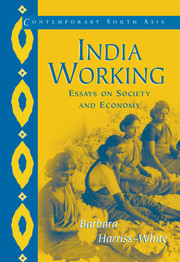Book contents
- Frontmatter
- Contents
- Preface and acknowledgments
- List of maps, figures and tables
- Glossary
- Abbreviations
- 1 Introduction: the character of the Indian economy
- 2 The workforce and its social structures
- 3 Indian development and the intermediate classes
- 4 The local State and the informal economy
- 5 Gender, family businesses and business families
- 6 India's religious pluralism and its implications for the economy
- 7 Caste and corporatist capitalism
- 8 Space and synergy
- 9 How India works
- 10 Postscript: proto-fascist politics and the economy
- Appendix 1 Liberalisation and Hindu fundamentalism
- Appendix 2 Relations between the developmental State and the intermediate classes
- Appendix 3 Roles of religious minorities in the Indian economy
- References
- Index of names
- Index of places
- Index of subjects
Preface and acknowledgments
Published online by Cambridge University Press: 06 July 2010
- Frontmatter
- Contents
- Preface and acknowledgments
- List of maps, figures and tables
- Glossary
- Abbreviations
- 1 Introduction: the character of the Indian economy
- 2 The workforce and its social structures
- 3 Indian development and the intermediate classes
- 4 The local State and the informal economy
- 5 Gender, family businesses and business families
- 6 India's religious pluralism and its implications for the economy
- 7 Caste and corporatist capitalism
- 8 Space and synergy
- 9 How India works
- 10 Postscript: proto-fascist politics and the economy
- Appendix 1 Liberalisation and Hindu fundamentalism
- Appendix 2 Relations between the developmental State and the intermediate classes
- Appendix 3 Roles of religious minorities in the Indian economy
- References
- Index of names
- Index of places
- Index of subjects
Summary
This book has developed from the Cambridge Commonwealth Lectures that I gave in 1999 under the title, ‘India Working: Working India’. This was a cryptic label with two sides to it. First, there was ‘India Working’, in which the economy and society were imagined as pieced together as a watchmaker might assemble a watch – with the difference that the economy is an organic social machine with ‘agents’ that affect its own working. Second, there was ‘Working India’, an interaction between theoretical ideas about the economy and field evidence of it, applied rather as a standup comedian works a club – provoking responses from the audience and ‘interpreting’ them. There is an enormous amount of material ‘from the audience’ for this book. I sought to limit it by celebrating the contributions to our understanding of the economy made by what its great exponent in Africa, Polly Hill, called ‘field economics’. Fieldwork on the Indian economy is carried out by surprisingly few economists, some anthropologists and students of politics, and many geographers. The project required an interdisciplinary approach and draws on anthropology, economics, gender studies, geography, politics and the sociology of law.
The result is a set of essays – which are just that – attempts and experiments. They are limited in their scope and none of them are to be considered complete, for doing justice to any of them would take several lifetimes.
- Type
- Chapter
- Information
- India WorkingEssays on Society and Economy, pp. x - xiiiPublisher: Cambridge University PressPrint publication year: 2002

